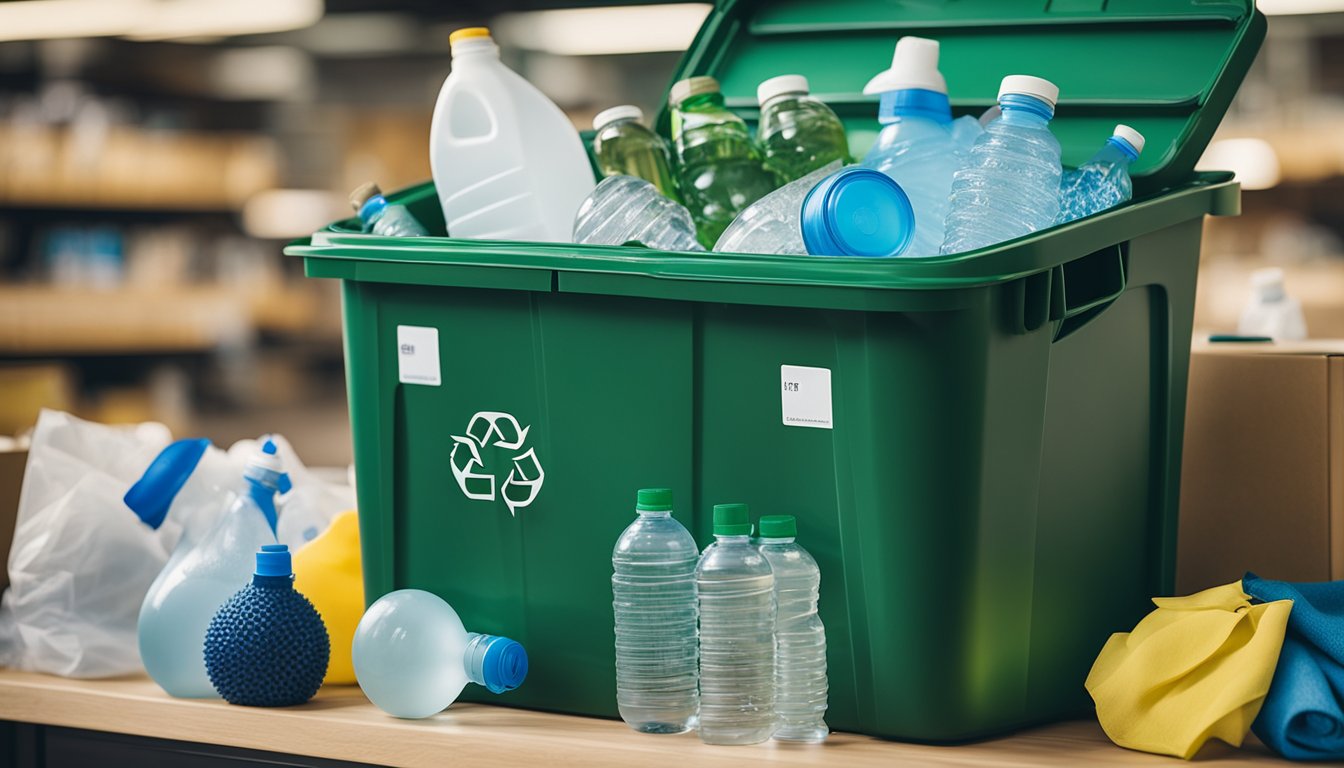Late updated: 03 Dec 2024 10:12
Written by: Sarah Hollister
Eco-Friendly Tips For Everyday Living: Simple Sustainable Practices
Embracing an eco-friendly lifestyle need not be a daunting task. It's about making everyday choices that collectively contribute to a healthier planet. Small steps such as choosing renewable energy sources and reducing single-use plastics can significantly reduce our environmental impact. As we adopt these practices, we benefit not only the environment but also enhance our overall well-being.

Our journey towards sustainable living starts with being mindful of our day-to-day habits. By consciously opting for eco-friendly products and conserving resources, we pave the way for a sustainable future. This shift is not just about the environment; it also positively influences our health, economy, and the communities we live in.
The key to successful integration of eco-friendly habits lies in persistence and intention. Whether it's reusing containers or supporting sustainable brands, each choice matters. Let's delve into some practical tips that can make our daily lives more sustainable and fulfilling.
Key Takeaways
- Eco-friendly habits can reduce our environmental impact.
- Conscious choices in daily life foster sustainability.
- Simple changes can enhance well-being and sustainability.
Foundations of an Eco-Friendly Lifestyle
To build a sustainable lifestyle, we must focus on key areas that have substantial environmental impacts, such as energy use, waste management, and the broader principles of sustainability and climate change.
Understanding Sustainability and Climate Change
Sustainable living is about using natural resources responsibly to ensure their availability for future generations. We need to address climate change, a major challenge caused by excessive carbon emissions from fossil fuels and deforestation. Recognising the interconnections between our daily choices and environmental impacts is crucial.
By reducing our carbon footprint, we can slow down climate change. This means cutting down on energy consumption and supporting renewable energy sources like solar and wind. Our collective actions can significantly decrease greenhouse gas emissions, contributing to a healthier planet.
The Role of Recycling and Waste Reduction
Recycling plays a critical role in reducing waste and conserving resources. It allows us to turn waste materials into reusable items, lowering the demand for raw materials. By embracing recycling, we can diminish landfill overuse and reduce pollution.
Waste reduction goes hand in hand with recycling. Adopting practices like composting organic waste and avoiding single-use plastics can make a big difference. We should prioritise reducing consumption and reusing items to minimise waste production at its source.
Energy Efficiency at Home
Improving energy efficiency at home can drastically cut energy consumption and save money. Using energy-efficient appliances, such as those with the Energy Star label, is a practical step. Additionally, smart thermostats help regulate home temperatures effectively, reducing unnecessary heating or cooling.
Simple changes like switching to LED lighting and ensuring homes are well-insulated can further enhance energy efficiency. These actions not only decrease our energy bills but also lessen our reliance on non-renewable energy sources, contributing to a cleaner environment.
By integrating these practices into our daily lives, we embrace a more eco-friendly lifestyle that benefits both us and the planet.
Adopting Sustainable Practices

Incorporating sustainable practices into our daily lives can significantly impact the environment positively. By focusing on renewable energy, local produce, eco-friendly transportation, responsible waste disposal, and water conservation, we can contribute to a healthier planet and a more sustainable lifestyle.
Choosing Renewable Over Conventional Energy
Transitioning from conventional energy sources to renewable ones is crucial for sustainability. We can install solar panels to harness the sun’s power, reducing reliance on fossil fuels. Other renewable options to consider are wind turbines and geothermal systems. These methods convert natural energy into electricity with minimal environmental impact.
Switching to green energy suppliers supports wider adoption of renewables. Not only does this reduce our carbon footprint, but it also provides long-term cost savings. Encouraging community initiatives and investment in renewable technologies fosters a collective move toward sustainable energy usage.
Supporting Local and Reducing Food Miles
Buying local produce is a practical way to support sustainability. By reducing food miles—the distance food travels from farm to table—we decrease carbon emissions associated with long-haul transportation. Shopping at farmers' markets or joining a local vegetable box scheme ensures fresher, seasonal goods.
Supporting local farmers and producers strengthens regional economies and promotes eco-tourism. Additionally, choosing organic products not only supports sustainable agricultural practices but also reduces chemical usage. Reducing meat consumption and opting for plant-based alternatives further minimise environmental impact.
Green Transportation Options
Opting for green transportation is a key factor in sustainable living. Electric vehicles (EVs), including cars and bicycles, offer an efficient alternative to traditional petrol and diesel engines. EVs have lower emissions and contribute to improved air quality.
Car-sharing schemes and public transport reduce the number of vehicles on the road, lessening traffic and pollution. Walking or cycling for short distances is a simple way to cut down on fossil fuel use while also promoting healthy living. Prioritising these options encourages urban development that supports greener transport infrastructure.
Waste Management and Organic Composting
Effective waste management practices are vital for reducing landfill impact. Separating recyclables and using biodegradable products minimise waste. Organic composting uses food scraps, leaves, and yard trimmings to create nutrient-rich soil, reducing the need for chemical fertilisers.
Implementing a composting system at home involves selecting a spot, gathering organic material, and maintaining it until it decomposes. Encouraging community composting initiatives can extend these benefits beyond individual households. By managing waste responsibly, we contribute to a decline in methane emissions, a potent greenhouse gas.
Water Conservation Techniques
Conserving water helps preserve this vital resource and reduce energy consumption associated with water treatment and heating. Simple practices such as fixing leaks, using water-efficient appliances, and collecting rainwater can significantly aid conservation efforts.
Installing low-flow showerheads and dual-flush toilets helps save thousands of litres yearly. Additionally, watering gardens during cooler times like early morning or late evening reduces evaporation. Educating others about water scarcity and innovative techniques fosters collective awareness and action towards conserving water.
Frequently Asked Questions

Let's address some common questions that people have when looking to adopt a more sustainable lifestyle. We'll cover practical ways to incorporate eco-friendly habits into various aspects of daily living.
How can I incorporate sustainable practices into my daily routine at home?
At home, we can limit our environmental impact by conserving energy and water. Using energy-efficient appliances, turning off lights when they're not needed, and fixing leaks promptly are effective ways. For waste reduction, consider composting food scraps and separating recyclables properly.
In what ways can I support eco-friendly product choices?
Supporting eco-friendly products involves choosing items made from sustainable materials and companies with environmentally responsible practices. Look for certifications like Fair Trade or organic labels. We can also reduce purchases of single-use plastics by opting for reusable alternatives.
What are some examples of sustainable living that I could emulate?
Examples of sustainable living include growing your own vegetables or participating in community gardening. Reducing meat consumption and buying locally sourced food are also effective methods. Emulating these practices helps reduce our carbon footprint and supports local economies.
As a student, how can I adopt a more eco-friendly lifestyle?
As students, we can embrace an eco-friendly lifestyle by using public transport or walking to reduce carbon emissions. Additionally, favouring digital submissions over printed documents will conserve paper. Engaging in environmental clubs and activities on campus can further this initiative.
What daily habits can I adopt to minimise my environmental impact?
Daily habits like bringing reusable bags and bottles, opting for eco-friendly cleaning products, and minimising water usage are impactful. Switching to digital subscriptions or using e-readers instead of printed materials can also conserve resources.
Could you suggest some environmentally friendly activities suitable for everyday life?
We can engage in activities such as cycling or hiking, which promote outdoor appreciation and low-impact travel. Volunteering in local clean-up efforts or tree planting activities is a way to contribute positively to our communities and the environment.
